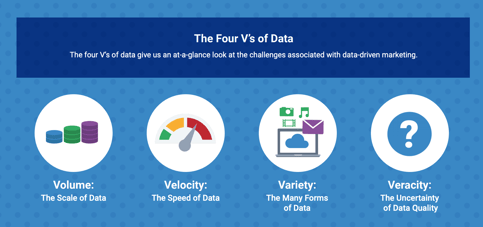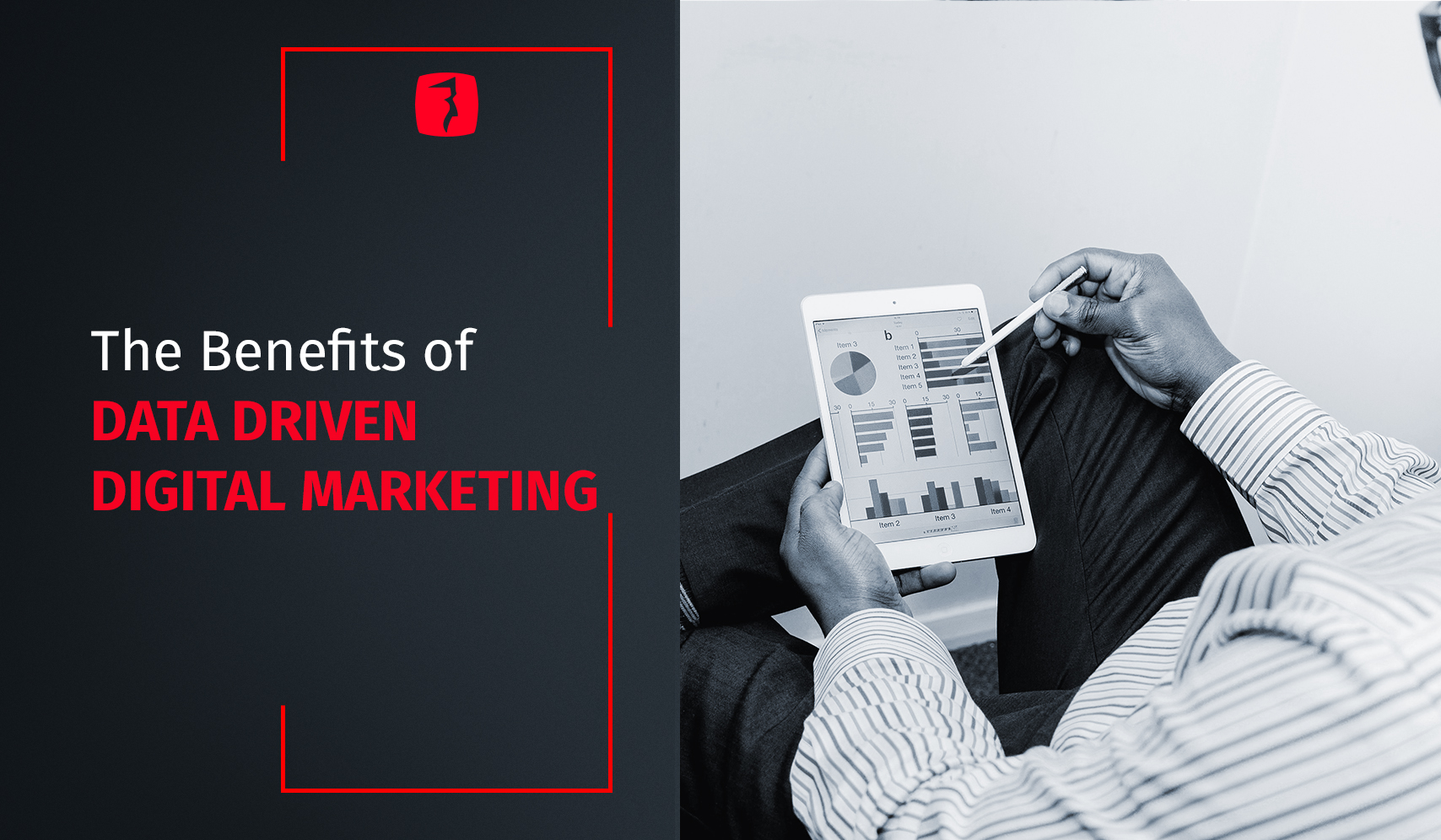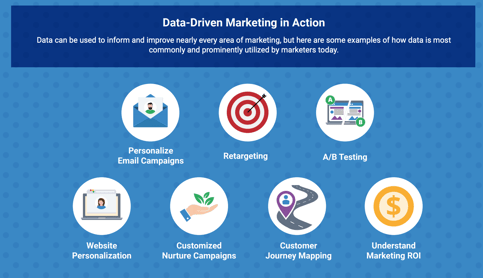The Benefits of Data Driven Digital Marketing
By Digital Marketing, data driven
Data is the fuel in today’s society. From market insights to customer behavior, companies use business analytics and intelligence to not only target their customers better but to gain a deeper understanding of their actions. Since social and digital marketing has become the norm for interacting with customers, organizations need to be lightning-fast when it comes to adapting their content marketing campaigns for the appropriate audiences. This is why data-driven digital marketing is becoming an integral part of everyday business. By utilizing data at hand, organizations lessen the risk of falling behind the competition and reap multiple benefits which we will discuss in further detail in the following paragraphs.
Data-Driven Marketing Obstacles
Before we dive into the benefits, let's see perhaps what are some of the main challenges with adopting a data-driven digital marketing approach. Realizing the significant benefits of data-driven marketing doesn’t come without its challenges. Many marketing teams face considerable obstacles when working to put data at the heart of their marketing strategies, tactics, and processes. There are three main challenges:
The proliferation of Tools and Data Sources
Marketing channels and technology stacks have expanded rapidly in recent years. The plethora of channels and tools used by today’s businesses can often lead to a fragmented and incomplete view of marketing and sales performance. And while marketing technology is needed and helpful, the addition of each new tool exacerbates the problem in absence of a unified view of results.
Siloed Data
The disconnect between CRM data and all the different marketing activities across tools hinders proper attribution of revenue and accurate ROI reporting. It creates an incomplete or absent view of which activities – sales or marketing – are producing real results. This leads to increasing conflict between sales and marketing and an inability to identify where to direct scarce business resources to drive revenue. Data siloes can also lead to data and reporting inaccuracies.
Limited Resources
Building effective creative content marketing campaign reporting in traditional business intelligence (BI) tools can be a huge undertaking and taxes the resources that marketing departments often find themselves short on – time and money. In addition, marketing teams often don’t have all the necessary skillsets in-house. Implementing a traditional BI solution typically requires more than six distinct skill sets and nearly 1,000 hours of effort across multiple functions of the business. The costs can exceed $200,000 for the initial build and ongoing maintenance is required.
The Four V’s of Marketing Data: A framework for a data-driven approach to digital marketing
The four V’s of data give us an at-a-glance look at the challenges associated with data-driven marketing

Right People, Right Digital Content, Right Time
Today, for professional and personal purchases alike, we all want personalized media experiences. In this regard, B2B and B2C marketing are no different. Customers, whether they are purchasing enterprise HR software or a new family car, want messaging and content that relates to them specifically. Data-driven marketing allows marketers to meet this customer demand. When you have data about who your audiences are, what they need, and when they need it, you can deliver the right content strategy, to the right people at the right time. This increases engagement, conversions, and, ultimately, revenue.
Better Audience Insights
Understanding customer needs and behaviors is critical to both creating and executing a successful marketing strategy. Data both fuels this effort and is a product of it. By using solid audience data in an email campaign, for example, you then generate more quality data based on the performance of that campaign. This cycle of data being the input and the output of marketing efforts is beneficial to organizations and consumers alike. Marketers can confidently use the audience insights gained from their data-based initiatives to further refine their targeted marketing efforts to give their customers what they really want and get what they really want – revenue – in return too.
Accurate Assessment of Performance
What works and what doesn’t? It’s an important question for marketers because it can mean the difference between wasted and successful efforts, and it can be answered with data. That data can also help marketing teams stop relying on hunches and anecdotal insights. Data-driven marketing instead provides concrete evidence of how tactics and strategies are truly performing. This accurate assessment of performance can help marketing departments save time and money by aligning around efforts that are the best use of resources.

Improve the Customer Experience
Do you lose touch with customers after their initial purchase? Or do customers stay engaged with your content for a year and then tune out? Or do your customers not respond to your requests for reviews or referrals? In other words, what part of your customer experience needs work? Data-driven marketing can help you get a better view of your entire customer experience so you can identify any gaps or missteps. Armed with this information, you can focus attention on fixing problem areas – perhaps by gathering more data through customer surveys, for example – while maintaining and optimizing those that are performing well.
Communicate Your Team’s Value
Marketing departments today are under tremendous pressure to prove their value. Marketing is now expected to be a revenue generation function rather than a cost center. This expectation means that the C-suite has more of a stake and interest in marketing performance. By leveraging data, marketers can communicate their value for regular or ad hoc reporting requests from executives. This focus on data also allows marketing teams to identify any performance issues that arise so they can get ahead of potential problems before they get out of control, further proving their value.
Generate More Revenue
One common theme that runs through the veins of any company is revenue. When it comes to utilizing data-driven marketing, everything becomes simple. Not only can you generate, maintain, utilize and optimize effective marketing campaigns, but you can reap much more revenue since everything becomes relevant for your audiences.
Latest Posts
Categories
- B2B Marketing (194)
- blog (147)
- Social media marketing (69)
- social media (53)
- Digital Marketing (43)
- Marketing (42)
- Lead Generation (39)
- Marketing Strategy (35)
- Lead Generation (33)
- B2B (30)
- Press releases (27)
- Behind the Scenes (26)
- marketing automation (26)
- Content Marketing (25)
- Marketing (21)
- Strategy (21)
- b2b tactics (19)
- AI (18)
- AI Marketing (18)
- b2b business objectives (17)
- online marketing (17)
- SEO (16)
- content marketing (15)
- B2B Campaigns (14)
- Business Growth (14)
- Business continuity (14)
- google ads (14)
- B2B Blogging (13)
- B2B business (13)
- PR Communication (13)
- b2b lead generation (13)
- PPC (12)
- b2b strategy (12)
- Marketing News (11)
- Marketing Planning (11)
- Social Media Strategy (11)
- marketing tips (11)
- B2B PPC Campaign (10)
- Conversion Rate (10)
- Employer Branding (10)
- Marketing Automation Tool (10)
- b2b social media (10)
- White papers (9)
- artificial intelligence marketing (9)
- inbound marketing (9)
- B2B companies (8)
- B2B email marketing (8)
- Fractional CMO (8)
- Twitter (8)
- crisis management (8)
- marketing automation for B2B businesses (8)
- online PR (8)
- ABM Strategy (7)
- E-books (7)
- Email Marketing (7)
- Facebook (7)
- HubSpot (7)
- Pinterest (7)
- SEO trends (7)
- b2b sales (7)
- content strategy (7)
- marketing plan (7)
- social networks (7)
- Business Development (6)
- CMO (6)
- Lead Generation Trends (6)
- Marketing Trends (6)
- SEO Strategies for B2B Companies (6)
- Webinar Recording (6)
- artificial intelligence (6)
- marketing objectives in b2b (6)
- sales prospecting (6)
- social media marketing campaign (6)
- social media trends (6)
- technology marketing (6)
- Business Intelligence (5)
- Digital Transformation (5)
- Events (5)
- Facebook page (5)
- Google AdWords (5)
- IT (5)
- Instagram (5)
- KPI measurements (5)
- Landing Page (5)
- LinkedIn (5)
- LinkedIn marketing strategy (5)
- Marketing Management (5)
- Video Content (5)
- automated marketing (5)
- b2b best practices (5)
- b2b prospecting (5)
- b2b strategies (5)
- digital communication strategy (5)
- internationalisation (5)
- marketing automation systems (5)
- trends (5)
- B2B marketing campaigns (4)
- B2B marketing inbound (4)
- Business Strategy (4)
- Cost per Lead (4)
- Digital Influence (4)
- HubSpot Certified Agency (4)
- NNC Services (4)
- Paid Advertising (4)
- Tech Startup (4)
- Tech Startup Marketing Strategy (4)
- Uncategorized (4)
- Video Marketing Strategy (4)
- b2b sales plan (4)
- best practices during crisis (4)
- brand engagement (4)
- leading marketing automation tools (4)
- market entry (4)
- marketing content (4)
- personal branding (4)
- proactive marketing (4)
- ABM sales outreach (3)
- Agile Marketing (3)
- B2B Email Marketing Campaigns (3)
- B2B Marketing Budget (3)
- B2B digital agency (3)
- B2B marketing strategy inbound (3)
- Conversion Rate Optimization (3)
- Financial (3)
- Google Analytics (3)
- Google+ (3)
- Internal Marketing (3)
- Lead Gen Automation Tools (3)
- Linkedin Groups (3)
- Marketing Automation Migration (3)
- Online Events (3)
- Pardot (3)
- Pardot to HubSpot Migration (3)
- Product Marketing (3)
- SMB international Business Models (3)
- Search Engine Optimization (3)
- Tech (3)
- Webinar (3)
- abm (3)
- b2b blogging (3)
- b2b customer aquisition (3)
- b2b growth (3)
- barriers to entry (3)
- blogging (3)
- business plan (3)
- buyer persona (3)
- customer research (3)
- demand generation (3)
- doing business abroad (3)
- employer brand (3)
- employer branding strategy (3)
- inbound leads (3)
- marketing audit (3)
- marketing automation strategy (3)
- marketing leadership (3)
- marketing portfolio audit (3)
- omnichannel marketing (3)
- online communities (3)
- online demand (3)
- outsourcing (3)
- prospects (3)
- storytelling (3)
- tech business (3)
- visual content (3)
- website optimization (3)
- 4P’s (2)
- B2B Contacts (2)
- B2B Marketing Collaterals (2)
- B2B presentations (2)
- Channel Integration (2)
- Customer-Centric (2)
- DIY business (2)
- E-Commerce (2)
- Facebook content (2)
- Go-to-Market Strategies (2)
- Hubspot Inbound (2)
- Hubspot Portal audit (2)
- Hubspot marketing portal (2)
- IT recruitment (2)
- Innovation (2)
- Integrated Marketing (2)
- Internship (2)
- Marketing Metrics (2)
- Microsoft Dynamics (2)
- PPT (2)
- Pay-per-Click (2)
- ROI (2)
- RevOps (2)
- SMART (2)
- SMB (2)
- SME (2)
- Sales Automation (2)
- Sales Automation Tools (2)
- Salesforce (2)
- Telemarketing (2)
- Tumblr (2)
- action plan (2)
- b2b planning (2)
- b2b tradeshow (2)
- b2b video marketing (2)
- banking (2)
- business communities (2)
- business management (2)
- buyer journey (2)
- buyer motivation (2)
- celebrities (2)
- client presentations (2)
- company marketing (2)
- company presentation rules (2)
- context marketing (2)
- conversion tracking (2)
- copywriting (2)
- corporate presentations (2)
- data driven (2)
- eCommerce Marketing (2)
- employee value proposition (2)
- employer value proposition (2)
- entertainment industry (2)
- entrepreneurs (2)
- free marketing tools (2)
- fundraising (2)
- gdpr (2)
- how to present in front of customers (2)
- how to write a presentation (2)
- marketing investing (2)
- marketing outsourcing (2)
- marketing segmentation (2)
- marketing upskilling (2)
- networking communities (2)
- nonprofits (2)
- online strategies (2)
- outbound marketing (2)
- outsourced marketing (2)
- ppc ads (2)
- ppc management (2)
- ppc strategy (2)
- presentation structure (2)
- product audit (2)
- product portfolio (2)
- promotion (2)
- sales enablement (2)
- sales funnel (2)
- segmentation (2)
- service marketing (2)
- slideshows (2)
- social platform (2)
- succes management (2)
- supporters (2)
- targeting (2)
- tourism industry (2)
- tradeshow attendance (2)
- tradeshow objectives (2)
- tradeshow results (2)
- tradeshow strategy (2)
- webinar tips (2)
- 2014 (1)
- ActiveCampaign (1)
- Ad Rank (1)
- AdidasOriginal (1)
- Android (1)
- B2B Case Study (1)
- B2B Digital Training (1)
- B2B SaaS startup strategy (1)
- B2B SaaS success factors (1)
- B2B content marketing trends (1)
- B2B e-mail copy (1)
- B2B e-mail marketing (1)
- B2B lead generation on LinkedIn (1)
- B2B marketing creative trends (1)
- B2B marketing on LinkedIn (1)
- BWBB (1)
- Blockchain (1)
- Blockchain Technologies (1)
- CTA button (1)
- Design Thinking Model (1)
- Direct Marketing (1)
- Dreamforce 2017 (1)
- Drip Marketing Campaign (1)
- Dynamics 365 (1)
- Dynamics 365 marketing (1)
- Dynamics Marketing (1)
- Eastern Central Europe (1)
- Eastern Europe (1)
- Emotional B2B Marketing (1)
- Employee Feedback (1)
- Event management (1)
- External Marketing (1)
- Facebook Apps (1)
- Facebook marketing (1)
- Freemium SaaS (1)
- Go-to-Market (1)
- Google Ad Grant (1)
- Google Ads statistics (1)
- GoogleAdGrant (1)
- HR planning (1)
- Hubspot Outbound (1)
- IT marketing (1)
- IT outsourcing (1)
- IT service price (1)
- Intel (1)
- LeadGeneration (1)
- LinkedIn B2B marketing (1)
- LinkedIn for business growth (1)
- Machine Learning (1)
- Market Entry Strategy (1)
- Market Research (1)
- Marketing Results (1)
- Marketing frameworks (1)
- Marketing vs Sales (1)
- Marketo (1)
- Medium Companies (1)
- Microsoft Dynamics 365 (1)
- NGO (1)
- Networking (1)
- Organizational culture (1)
- PPC statistics (1)
- PPC stats (1)
- Personalized messages (1)
- Pictures (1)
- Podcast SEO (1)
- Price (1)
- Recruitment Marketing (1)
- Revenue operations (1)
- Romanian content marketers (1)
- SaaS (1)
- SaaS startup growth (1)
- Salesforce Partners (1)
- SharpSpring (1)
- Small Business (1)
- Social Proof (1)
- StopWar (1)
- Tactics (1)
- Target (1)
- Tech events (1)
- Template (1)
- Till Hahndorf (1)
- Types of Google Ads (1)
- Ukraine (1)
- VirginAmerica (1)
- Voice Search SEO (1)
- Work alternative (1)
- Youtube Ads (1)
- ads setting (1)
- app (1)
- artists (1)
- b2b benchmark (1)
- b2b buyer (1)
- b2b buying process (1)
- b2b buying trends (1)
- b2b customers (1)
- b2b marketing vs sales (1)
- b2b modeling (1)
- b2b price (1)
- b2b viral campaign (1)
- benghmarking (1)
- best practices for B2B marketing on LinkedIn (1)
- brand advocates (1)
- business (1)
- business growth course (1)
- buyer behaviour in b2b (1)
- buyer persona template (1)
- buyers (1)
- call to action (1)
- clients (1)
- cold-calling (1)
- company (1)
- competition (1)
- creative marketing strategies for B2B (1)
- customer segmentation (1)
- cybersecuritystrategy (1)
- dan schawbel (1)
- detailed buyer persona (1)
- differentiators (1)
- downloadable resources (1)
- e-mail campaigns (1)
- e-mail message and copy (1)
- employer brand experience (1)
- employer of choice (1)
- environmental marketing (1)
- fans (1)
- gdpr benefits (1)
- gdpr benefits for marketing (1)
- go-to-market channels (1)
- green marketing (1)
- growth marketing (1)
- hotel (1)
- how to find leads (1)
- how to sell (1)
- how to use LinkedIn for B2B marketing (1)
- human resources (1)
- iOS (1)
- inbound marketing services (1)
- inbound marketing vs outbound marketing (1)
- international business (1)
- investment in marketing (1)
- investors (1)
- jamie oliver (1)
- lead generation results (1)
- leads (1)
- letter writing (1)
- like (1)
- market price (1)
- marketing benchmarking (1)
- marketing flywheel (1)
- marketing goals (1)
- marketing investments (1)
- marketing letters (1)
- marketing message (1)
- marketing objectives (1)
- marketing strategy for 2022 (1)
- mobile (1)
- mobile marketing (1)
- music (1)
- new business opportunities (1)
- online reputation (1)
- peak-end rule in B2B marketing (1)
- personal branding tips (1)
- personell issues (1)
- photos (1)
- podcast (1)
- positive employer brand (1)
- ppc click fraud (1)
- price debate (1)
- price negociation (1)
- pricing (1)
- pricing stratey (1)
- product cost (1)
- product price (1)
- promote (1)
- publicity vs persuasion in B2B marketing (1)
- recession tactics (1)
- roadmap (1)
- sales (1)
- script (1)
- seo practices (1)
- service price (1)
- services (1)
- setting objectives (1)
- setting the price (1)
- smart bidding (1)
- social channels (1)
- social media for B2B thought leadership (1)
- social networking (1)
- social recruitment (1)
- startup (1)
- subscribers (1)
- sustainability (1)
- tailored experience (1)
- talent pool (1)
- tech hub (1)
- tech professionals (1)
- thought leadership content (1)
- thought leadership on social media (1)
- tools (1)
- updates (1)
- using characters in B2B advertising (1)
- viral campaignes (1)
- viral marketing (1)
- viral videos (1)
- visual (1)
- voice search optimization (1)








.png?width=100&name=cover%20blogposts%20sm%20website%20(6).png)
.png?width=767&name=cover%20blogposts%20sm%20website%20(2).png)
.png?width=767&name=cover%20blogposts%20sm%20website%20(1).png)
.png?width=767&name=Blog%20Post%20(18).png)
.png?width=767&name=Blog%20Post%20(17).png)
.png?width=767&name=Blog%20Post%20(16).png)

-1.png?width=767&name=NNC%20Blog%20featured%20image%20(8)-1.png)
-2.png?width=767&name=NNC%20Blog%20featured%20image%20(1)-2.png)




